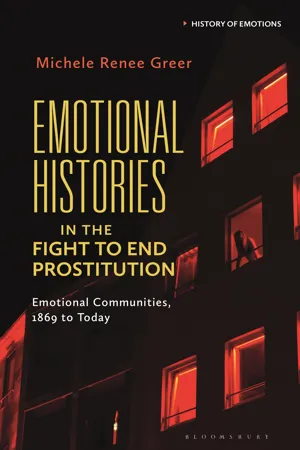
Emotional Histories in the Fight to End Prostitution
Emotional Communities, 1869 to Today
- 232 pages
- English
- ePUB (mobile friendly)
- Available on iOS & Android
Emotional Histories in the Fight to End Prostitution
Emotional Communities, 1869 to Today
About This Book
This book sheds new light on the ongoing fight to end prostitution through a historical study of its emotional communities. An issue that has long been the subject of much debate amongst feminists, governments and communities alike, the history of the fight to end prostitution has an important bearing on feminist politics today. This book identifies key abolitionist emotional communities, tracing their origins, interactions and evolutions with various historical and contemporary emotional styles. In doing do, Emotional Histories in the Fight to End Prostitution highlights a more nuanced view of the movement's history. From Moral Liberals in 19th century Britain to the American anti-pornography movement and Swedish 'Nordic Model', Emotional Histories in the Fight to End Prostitution shows how emotional styles and practices have influenced the evolution of the fight against prostitution in Britain, the United States and Western Europe. From the fear of sin, to maternal compassion and survivor shame and loss, Michele Greer historicizes emotions and studies them as dynamic forms of situated knowledge. In doing so, she sheds light on how women's lived experiences have been transformed and politicized, and raises important questions around how feminist emotions in social protest can not only challenge but unknowingly defend existing socio-political conventions and inequalities. Highlighting the links between past and present forms of abolitionism, it shows that this connection is more complex and far-reaching than currently assumed, and offers new perspectives on the history of emotions.
Frequently asked questions
Information
Table of contents
- Cover
- Halftitle Page
- Title Page
- Contents
- Acknowledgments
- Introduction
- 1 Moral Liberals and the Monstrosities of State Medicine (1869–1880s)
- 2 Purity Crusaders and the Threat of Degeneracy (1880s–1920s)
- 3 Maternal Feminists: From Social Mothers to New Women (1880s–1930s)
- 4 Global Doldrums and National Vestiges (1940s–1960s)
- 5 Radical Feminists and Raging Wounds (1970s–today)
- 6 Social Regulators: Shifting the Burden (1980s–today)
- 7 Survivors: Suffering as Expertise (1980s–today)
- Conclusion
- Notes
- Bibliography
- Index
- Imprint